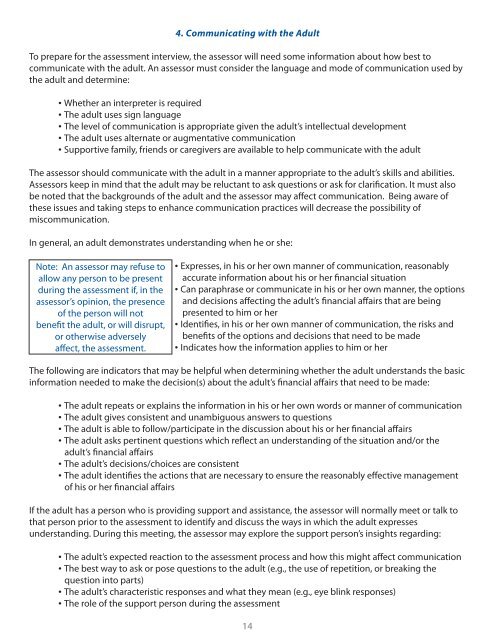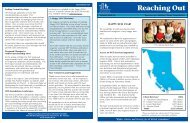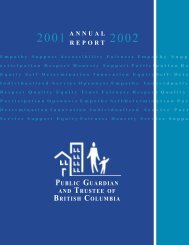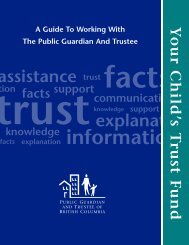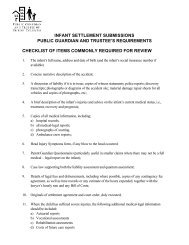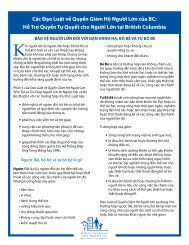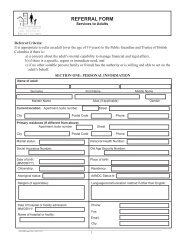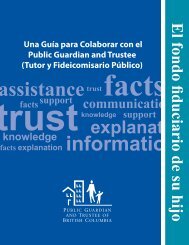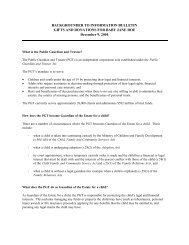Guidelines for Issuing a Certificate of Incapability under the Patients ...
Guidelines for Issuing a Certificate of Incapability under the Patients ...
Guidelines for Issuing a Certificate of Incapability under the Patients ...
You also want an ePaper? Increase the reach of your titles
YUMPU automatically turns print PDFs into web optimized ePapers that Google loves.
4. Communicating with <strong>the</strong> Adult<br />
To prepare <strong>for</strong> <strong>the</strong> assessment interview, <strong>the</strong> assessor will need some in<strong>for</strong>mation about how best to<br />
communicate with <strong>the</strong> adult. An assessor must consider <strong>the</strong> language and mode <strong>of</strong> communication used by<br />
<strong>the</strong> adult and determine:<br />
• Whe<strong>the</strong>r an interpreter is required<br />
• The adult uses sign language<br />
• The level <strong>of</strong> communication is appropriate given <strong>the</strong> adult’s intellectual development<br />
• The adult uses alternate or augmentative communication<br />
• Supportive family, friends or caregivers are available to help communicate with <strong>the</strong> adult<br />
The assessor should communicate with <strong>the</strong> adult in a manner appropriate to <strong>the</strong> adult’s skills and abilities.<br />
Assessors keep in mind that <strong>the</strong> adult may be reluctant to ask questions or ask <strong>for</strong> clarification. It must also<br />
be noted that <strong>the</strong> backgrounds <strong>of</strong> <strong>the</strong> adult and <strong>the</strong> assessor may affect communication. Being aware <strong>of</strong><br />
<strong>the</strong>se issues and taking steps to enhance communication practices will decrease <strong>the</strong> possibility <strong>of</strong><br />
miscommunication.<br />
In general, an adult demonstrates <strong>under</strong>standing when he or she:<br />
Note: An assessor may refuse to<br />
allow any person to be present<br />
during <strong>the</strong> assessment if, in <strong>the</strong><br />
assessor’s opinion, <strong>the</strong> presence<br />
<strong>of</strong> <strong>the</strong> person will not<br />
benefit <strong>the</strong> adult, or will disrupt,<br />
or o<strong>the</strong>rwise adversely<br />
affect, <strong>the</strong> assessment.<br />
• Expresses, in his or her own manner <strong>of</strong> communication, reasonably<br />
accurate in<strong>for</strong>mation about his or her financial situation<br />
• Can paraphrase or communicate in his or her own manner, <strong>the</strong> options<br />
and decisions affecting <strong>the</strong> adult’s financial affairs that are being<br />
presented to him or her<br />
• Identifies, in his or her own manner <strong>of</strong> communication, <strong>the</strong> risks and<br />
benefits <strong>of</strong> <strong>the</strong> options and decisions that need to be made<br />
• Indicates how <strong>the</strong> in<strong>for</strong>mation applies to him or her<br />
The following are indicators that may be helpful when determining whe<strong>the</strong>r <strong>the</strong> adult <strong>under</strong>stands <strong>the</strong> basic<br />
in<strong>for</strong>mation needed to make <strong>the</strong> decision(s) about <strong>the</strong> adult’s financial affairs that need to be made:<br />
• The adult repeats or explains <strong>the</strong> in<strong>for</strong>mation in his or her own words or manner <strong>of</strong> communication<br />
• The adult gives consistent and unambiguous answers to questions<br />
• The adult is able to follow/participate in <strong>the</strong> discussion about his or her financial affairs<br />
• The adult asks pertinent questions which reflect an <strong>under</strong>standing <strong>of</strong> <strong>the</strong> situation and/or <strong>the</strong><br />
adult’s financial affairs<br />
• The adult’s decisions/choices are consistent<br />
• The adult identifies <strong>the</strong> actions that are necessary to ensure <strong>the</strong> reasonably effective management<br />
<strong>of</strong> his or her financial affairs<br />
If <strong>the</strong> adult has a person who is providing support and assistance, <strong>the</strong> assessor will normally meet or talk to<br />
that person prior to <strong>the</strong> assessment to identify and discuss <strong>the</strong> ways in which <strong>the</strong> adult expresses<br />
<strong>under</strong>standing. During this meeting, <strong>the</strong> assessor may explore <strong>the</strong> support person’s insights regarding:<br />
• The adult’s expected reaction to <strong>the</strong> assessment process and how this might affect communication<br />
• The best way to ask or pose questions to <strong>the</strong> adult (e.g., <strong>the</strong> use <strong>of</strong> repetition, or breaking <strong>the</strong><br />
question into parts)<br />
• The adult’s characteristic responses and what <strong>the</strong>y mean (e.g., eye blink responses)<br />
• The role <strong>of</strong> <strong>the</strong> support person during <strong>the</strong> assessment<br />
14


